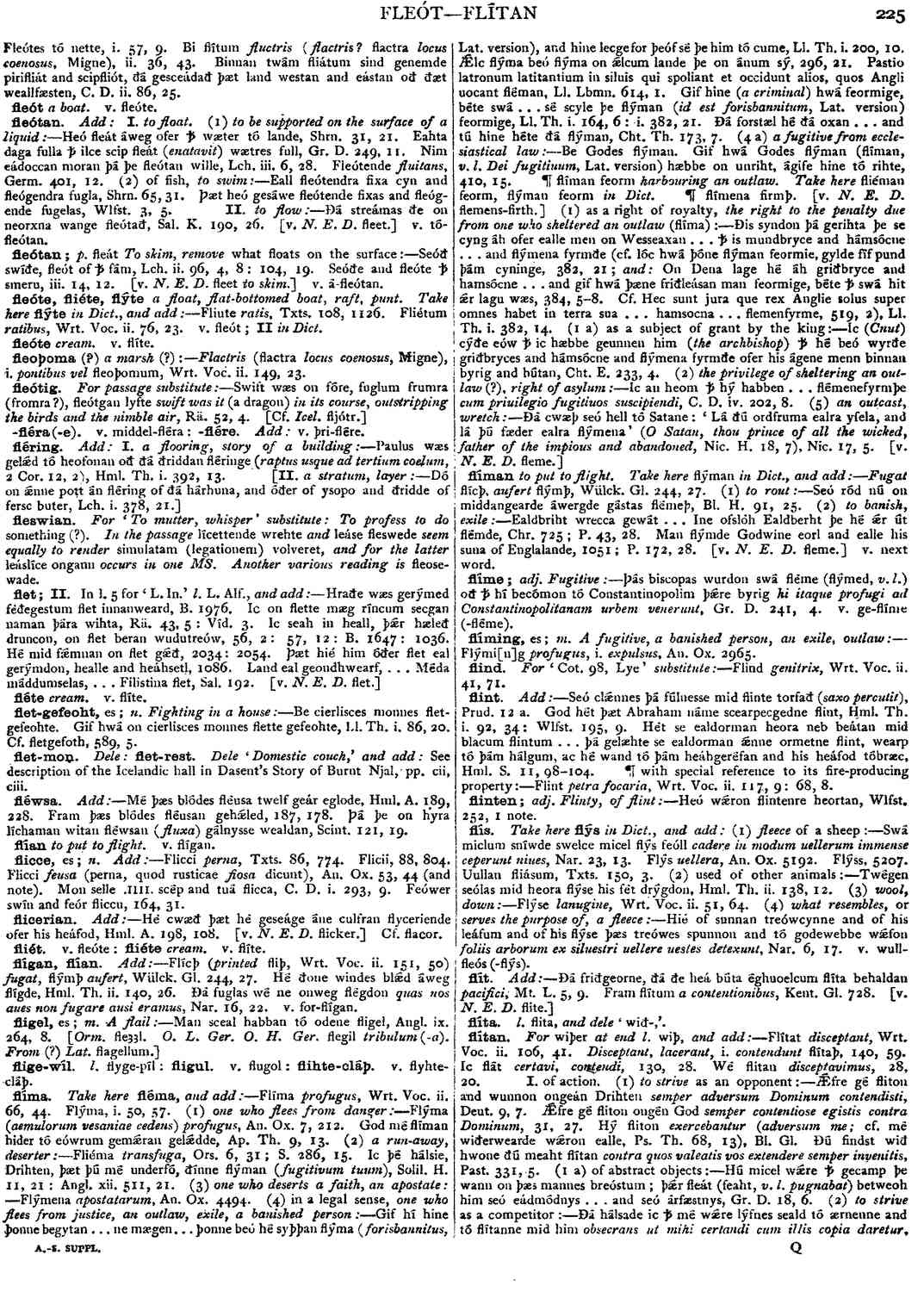flíma
- noun [ masculine ]
-
Flíma
profugus,
- Wrt. Voc. ii. 66, 44 .
-
Flýma,
- i. 50, . 57
-
Flýma
(aemulorum vesaniae cedens) profugus,
- An. Ox. 7a 213 .
-
God mé flíman hider tó cówrum gemǽran gelǽdde,
- Ap. Th. 9, 13 .
-
Fliéma
transfuga,
- Ors. 6, 31 ;
- S. 286, 15 .
-
Ic þé hálsie, Drihten, þæt þú mé underfó, ðínne flýman
(fugitivum tuum),
- Solil. H. li, 21 :
- Angl. xii. 511, 21 .
-
Flýmena
apostatarum,
- An. Ox. 4494 .
-
Gif hí híne þonne begytan . . . ne mægen. . . þonne beó hé syþþan flýma
(forisbannitus,Lat. version),
and hine lecgefor þeóf sé þe him tó cume,
- LI. Th. i. 200, lo.
-
Ǽlc flýma beó flýma on ǽlcum lande þe on ánum sý,
- 296, 21.
-
Pastio latronum latitantium in siluis qui spoliant et occidunt alios, quos Angli uocant fléman,
- Ll. Lbmn. 614, I.
-
Gif hine
(a criminal)
hwá feormige, béte swí . . . sé scyle þe flýman
(id esí forisbannitum, Lat. version)
feormige,
- Ll. Th. i. 164, 6 :
- i. 382, 21 .
-
Ðá forstæl hé ðá oxan . . . and tú hine héte ðá flýman,
- Cht. Th. 173, 7.
-
Be Godes flýman. Gif hwá Godes flýman (flíman, v.l.
Dei fugitiuum, Lat. version)
hæbbe on unriht, ágife hine tó rihte,
- 410, 15 .
-
Ðis syndon þá gerihta þe se cyng áh ofer ealle men on Wesseaxan . . . ꝥ is mundbryce and hámsócne . . . and flýmena fyrmðe (cf. 1óc hwá þðne flýman feormie, gylde fîf pund þám cyninge,
- 382, 21;
On Dena lage hé áh griðbryce and hamsócne . . . and gif hwá þæne friðleásan man feormige, béte ꝥ swí hit ǽr lagu wæs,
- 384, 5-8 .
-
Cf. Hec sunt jura que rex Anglie solus super omnes habet in terra sua . . . hamsocna . . . flemenfyrme,
- 519, 2 ),
- Ll. Th. i. 382, 14 .
-
Ic (Cnut) cýðe eów ꝥ ic hæbbe geunnen him
(the archbishop)
ꝥ hé beó wyrðe griðbryces and hámsócne and flýmena fyrmðe ofer his ágene menn binnan byrig and hútan,
- Cht. E. 233, 4 .
-
Ic an heom ꝥ hý habben . . . flémenefyrmþe
cum priuilegio fugitiuos suscipiendi, C.
- D. iv. 202, 8 .
-
Ðá cwæþ seó hell tó Satane: ' Lá ðú ordfruma ealra yfela, and lá þú fæder ealra flýmena'
(O Satan, thou prince of all the wicked, father of the impious and abandoned,
- Nic. H. 18, 7 ),
- Nic. 17, 5 .
Bosworth, Joseph. “flíma.” In An Anglo-Saxon Dictionary Online, edited by Thomas Northcote Toller, Christ Sean, and Ondřej Tichy. Prague: Faculty of Arts, Charles University, 2014. https://bosworthtoller.com/45232.
Checked: 1